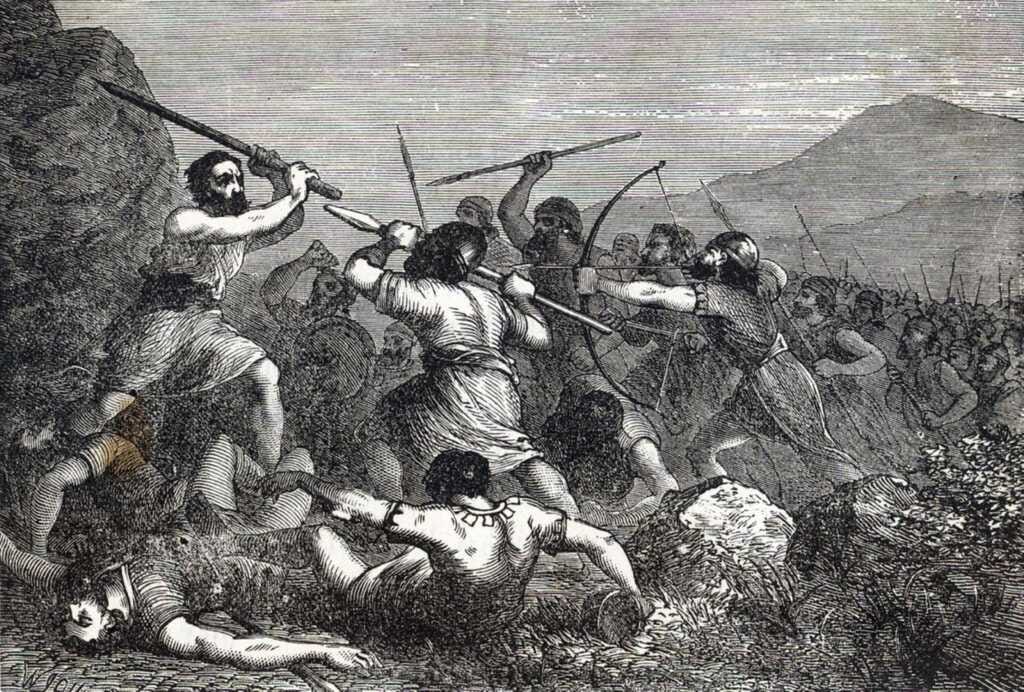Judges 3.31
After him came Shamgar son of Anath, who killed six hundred of the Philistines with an ox-goad. He too delivered Israel.
This is by far and away one of my favorite stories in the whole of Scripture, and it has been more influential in my life than one might anticipate.
First, let’s start with all the things we don’t know.
We don’t know whether Shamgar was an Israelite, it could well be a Hittite name.
We don’t know exactly when this happened, as he’s not referenced as all the other judges are elsewhere.*
We don’t know why he killed the 600 Philistines.
We don’t know why Philistines, by all accounts they weren’t an issue until later.
We don’t know how killing them helped things.
We don’t know why it’s mentioned straight after Ehud when the next sentences refer back to Ehud.
We don’t know how he killed the 600 Philistines. Was it as in the picture or a more one at a time type deal? And was he alone?
Unlike Ehud’s vivid movie portrayal of a dramatic assassination, here we seem to glance over a situation which by rights we should surely spend far more time on - we’re left with a lot of unanswered questions here.
However, what we do know is that he was called Shamgar.
He killed a load of people.
He did so with a signature weapon - an ox goad.
Reverend George F. Moore describes the ox goad thusly:
“The syrian ploughman’s goad is a formidable weapon, sometimes eight feet long, armed at one end with a spike, at the other with a chisel-shaped blade for cleaning the plough; and on occasion would make a very good substitute for a spear.”
This then seems to suggest that Shamgar was not a trained soldier, or even if he was that he was not fighting in a military scenario. What is about to follow is purely my imagination running wild with the minimal details we have but when I think of Shamgar and his Ox Goad I like to suppose that he was a foreign man, a Hittite, who had married an Israelite woman. He wasn’t just a foreigner, but may even have worshipped a Canaanite warrior Goddess called Anath, who was the sister/lover of the pagan god Baal. I like to imagine that being a worshipper of a warrior Goddess he would have trained his body and been capable of holding his ground in a fight, yet settled peaceably in the land with his Israelite wife. He’s living on his farm, or maybe they’re camped out somewhere on their nomadic travels around the country. One morning he wakes up, steps out of the tent and he can see dust coming from over the hill and hears the sounds of people. He grabs his ox-goad and scouts out the situation. He realises that there’s a load of armed men heading towards the settlement where his wife’s family lives. There’s no time to warn them, and if he doesn’t do something then they’re in trouble. As such he does what he can, and begins to pick off the scouts in the hills and ambushing smaller groups of men. In this way he whittles them down from 600 to 500. There’s still a lot of men left, but it’s now or never. With a muttered prayer he steps forward, swirls his ox-goad in his hands as he feels a sense of life coursing through his veins and launches an attack.
A couple of hours later the midday sun is hot on his back as he leans against the ox goad, an arm wiping his bloodied brow as his lungs heave and he catches his breath. His body is bruised and battered, cuts stinging sharply as the fatigue kicks in. Around him is a scene of unimaginable carnage. It’s as he slumps down and sits with his back against a rock that a group of Israelites from the city discover him and take in the scene. This man, this Shamgar, has delivered Israel from a deadly threat. An inhuman feat. Only one blessed by God could have managed this.
Something along those lines is what I imagine when I think of Shamgar.
But it’s not the imaginary scenario which is striking about this verse. What’s striking is the sense of perspective that verse challenges us with. Whatever acts of heroism actually occurred, they got but a single line in the record.
How often do we expect validation for the actions we do? Praise for our achievements? Recognition of our impact, our legacy?
At what point does validation for the act supersede the value of the act?
What’s more important? That Shamgar killed 600 Philistines like a legendary bad-ass with an ox goad? Or that ‘he too delivered Israel’?
This one verse about Shamgar has served as a check on my ego since I was a teenager. It challenges me to recognise that even if (when) I have an impact on the lives of those around me, it’s still only a single sentence in the story of God and his people.
That’s not to diminish the importance of any impact I, or Shamgar, or you may have. Rather it is an acknowledgement that our lives take place in the context of a story which plays out on the grand stage of reality itself.
Even in an obscure verse of a bloodstained book in a collection of ancient writings there are lessons to learn which are profitable for our souls.
Until tomorrow,
With every blessing,
Revd Samuel S. Thorp
*Judges 5.6 mentions Shamgar in passing but doesn’t add to this story.
In the days of Shamgar son of Anath,
in the days of Jael, the highways were abandoned;
travelers took to winding paths.




